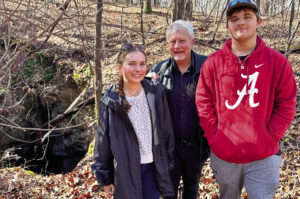Lauderdale’s road repair machine named for Palmer
FLORENCE — A new process for repairing roads before they’re resurfaced can save Lauderdale County money in labor, fuel and stone by utilizing the existing pavement and base material.
And the machine that will do the work has been named “The Palmer” after former Franklin County Engineer David Palmer.
Lauderdale County Engineer Eric Hill said when the Road Department plans to resurface a road, it is analyzed for base failures, weak areas or continuous potholes and other issues.
“Historically, we mark those areas, dig that material out, put it into a truck and haul it off, bring in rock, put it in the hole, compact it and pave over it,” Hill said. “It worked great, but it’s labor and equipment intensive.”
Starting about a year ago, Hill said, the department started a new process called “soil cement stabilization.”
“We have the largest garden tiller in Lauderdale County,” Hill said.
The “garden tiller” is a road reclamation machine that grinds up material under the driving surface in the affected area, incorporates powdered cement and “very precisely and scientifically” incorporates moisture to the mix.
The water, cement and rock make concrete. The mixture is smoothed with a compactor and when it hardens, new asphalt can be laid over the affected area.
So instead of hauling off old material and bringing in new stone, the system utilizes and “recycles” the existing material.
“We’ve had really, really good results with this,” Hill said.
Palmer used the system for years, said Hill.
“We nicknamed our machine, ‘The Palmer,’” Hill said. “He was an innovator in this in the state.”
Palmer, who is now a Russellville City Council member, was Franklin County’s engineer for 32 years.
“When I became county engineer in Franklin County, I realized quickly we had base failures all over because of the soil conditions down there,” Palmer said. “There was a high percentage of base failures.”
At that time, Palmer said the Franklin County Road Department repaired the base failures the conventional way Hill described.
“That’s fine if you’ve got a spot here and a spot there, but when you’re talking about 20% to 30% of a stretch of road, it’s hard to make any progress with the time and money it takes,” Palmer said. “I was in a situation where I really didn’t know what to do.”
But along came a Caterpillar Inc. salesman who showed him a VHS video of a full depth reclamation machine that turned out to be exactly what Palmer needed.
“I watched it, and it was like the clouds parted and the angels started singing, and I realized this was the answer to my problem,” Palmer said.
The video was from New York State, Palmer said, and the machines weren’t readily available in the region.
He located one in Birmingham, rented and used it for a month and loved the results.
“Shortly after, the county commission saw the value and agreed to purchase the machine,” Palmer said.
He said he eventually began utilizing the soil cement stabilization process Hill utilizes today.
Out of the roughly 600 miles of paved roads in Franklin County, Palmer said about 200 have had full depth reclamation using the reclamation machine.
He and Hill explained you’re basically recycling the material that’s already in place.
Hill said the Road Department spent about $600,000 on the reclamation machine, and another $400,000 on a tanker for cement and new compactors.
Hill said he can repair a 1.5-mile stretch of road in five days that used to take five weeks to repair.
“It’s a cool process,” Hill said. “It’s like a whole new world.”
Palmer said the system saved Franklin County money on road repairs. He said Hill could recuperate his roughly $1 million investment in a couple years.
Palmer said he’s honored Hill dubbed their machine “The Palmer.”
“Everybody has to be known for something,” Palmer said. “I’m honored he decided to do that.”











